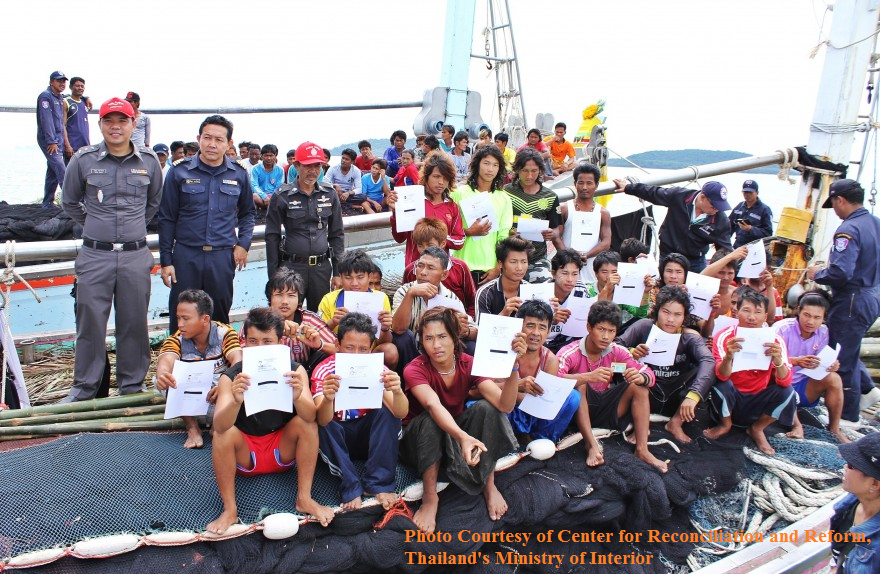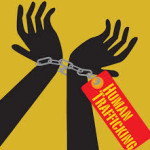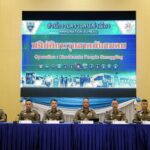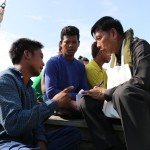

UPDATE
TRAFFICKING IN PERSONS REPORT 2015
The Royal Thai Government Response
1 January – 31 March 2016
Summary
The Update documents Thailand’s efforts to combat human trafficking during the first three months of 2016, which constitute the final quarter of the 2015 assessment year. The measures taken during the final quarter, when combined with progress achieved throughout 2015, provide powerful evidence that Thailand is exceeding the minimum standards for the elimination of trafficking as defined by the United States Department of State.
In justice and law enforcement, existing prosecutions against officials involved or complicit in trafficking were advancing rapidly through a specialized new court system. Police made several new arrests, rescued 108 more victims – between January and March 2016 alone – and were launching fresh investigations. In 2012, less than 50 traffickers were convicted and sentenced by Thailand’s courts. Since then, Thailand’s courts have convicted and sentenced 575 human traffickers, with 241 sentenced during calendar year 2015 alone. More convictions are certain to be made this year. A total of 34 officials involved or complicit in trafficking are among those facing prosecution. One case discussed in the main report submitted in January 2016 has now reached a verdict; i.e. an employee at the Ministry of Social Development and Human Security was sentenced to imprisonment of 16 years. She must also pay compensation to 6 victims, amounting to 60,000 THB ($1,697) for each victim.
In addition, the largest trial of traffickers in Thai history, with 92 defendants including 22 officials who are accused of trafficking ethnic Rohingya and other migrants, has begun. While the Rohingya case is unlikely to reach a verdict within a year, given the complexity of the case, it will continue make solid progress throughout the rest of this year. Nevertheless, those on trial are facing the prospect of more severe penalties, including the possibility of the death penalty, as a result of amendments passed to the Anti-Human Trafficking Law in 2015. Sentences of 50 years, for instance, have been handed down to some defendants on a single charge in other trafficking trials and a cumulative sentence of 150 years when several charges are combined.
The last known Thais stranded in Indonesia, 57 victims of trafficking, together with over 1,800 crewmembers on fishing vessels, were brought back home, and Thailand and Indonesia are cooperating to bring traffickers to justice in their respective jurisdictions. This has been achieved in partnership with the Labor Rights Promotion Network (LPN) Foundation and Stella Maris, which assisted in bringing the victims of trafficking home and in providing intelligence for successful prosecutions. Both also assisted in providing rehabilitation services to these victims.
Sheltering and protecting victims are priorities in the Thai response to trafficking. More resources have been devoted to this aspect of the response. Working with partners in the civil society and the United Nations, victims were receiving increased services and opportunities for education, counseling, financial and legal support, and repatriation home or resettlement in third countries when appropriate.
For victims and witnesses remaining in Thailand, the Cabinet approved additional measures on 15 March 2016 to better protect and support victims and witnesses of trafficking. The measures include extending a period of that that victims and witnesses can stay and work legally in Thailand from six months to one year and can be renewed one year at a time while their cases are ongoing. The process of obtaining the needed permits was streamlined from 45 days to 10 days maximum. For victims of trafficking, the Anti-Human Trafficking Fund now covers the cost of medical examination and health insurance that are necessary for the applications of their work permits.
No response can be truly effective without a sustained emphasis on prevention. A new working group, comprising of senior officials from various departments within the Ministry of Labor and several representatives from various civil society organizations, is beginning its dialogue on how to further protect migrant workers in Thailand. In the meantime, work already moved forward on developing a management system for migrant workers, with 149,623 illegal migrants now registered in the fishing and seafood processing industries, compared to just 6,864 in 2014. The rights of workers in those industries were better protected, including the right to change employers, which 7,176 seafood processing and 3,235 fishery workers did from November through March.
Sweeping reforms were being implemented in the fishing and seafood sectors, with new laws and regulations that have resulted in tens of thousands of Port-In/Port-Out inspections of fishing vessels to prevent vessels from using undocumented migrants, and over 8,000 inspections at sea. The Government and the private sector took significant moves towards establishing an effective catch traceability system to stop illegal, unregulated and unreported (IUU) fishing and also to ensure a clean supply chain. One example of several measures now in place included private companies, such as Thai Union Seafood and CP Foods, having moved all operations in-house, to ensure their supply chains are not tainted by human trafficking or labor abuse.
Policy measures to fight trafficking continued to be strengthened. Amendments to the Anti-Human Trafficking Act to bolster protections for victims were proceeding through the legislature. Apart from other legislations approved earlier in the year 2015, a separate Act, the Human Trafficking Criminal Procedure Act, has also just been passed to accelerate the judicial process in trafficking cases. It will prohibit and severely punish officials from taking any action that may aid or abet suspects. In addition, a regulation issued by the Prime Minister which forbids and punishes officials from any action to aid a trafficking suspect is now yielding results. The Government is also in the process of passing a new Ordinance to better control and regulate migrant employment agencies, and is in consultations with the ILO to ensure it conforms to international standards. Thailand also ratified ILO Convention 187 on the Promotional Framework for Occupational Safety and Health, and the supplementary procedures to Convention 29 on Forced Labor. The Government continues to work hard to prepare for the ratification of other ILO Conventions, including C188 which it hopes to ratify within this year.
In the area of partnerships, Thailand co-hosted the 10th Bali Process Ad Hoc Group Senior Officials Meeting, together with Australia and Indonesia as the two Co-Chairs of the Bali Process. The Ministry of Labor announced a partnership with the ILO and the European Union for a 42-month joint project called Combating Unacceptable Forms of Work in the Thai Fishing and Seafood Industry. Thai officials met several times with their counterparts from Myanmar, Cambodia and the Lao People’s Democratic Republic to negotiate and advance agreements on regulating the flow of migrants. To provide services to victims, Thailand partners with groups such as Stella Maris and Save the Children. Dialogue with rights advocates such as Human Rights Watch and Fortify Rights ensures Thailand adheres to a human rights perspective in its efforts. Collaboration with the Environmental Justice Foundation (EFJ) too has led to concrete progress in Thailand’s fight against IUU and human trafficking in the fishing sector.
This Government is the first Thai Government that has launched and is implementing a comprehensive cross-sector response to the problem of human trafficking. It is a response that is designed to be sustainable. While Thailand agrees that more must be done to defeat trafficking, it is worth noting that none of the systems and measures introduced in this final quarter and the year 2015 existed when Thailand was ranked as a Tier 2 country by the U.S. Department of State Trafficking in Persons Office.
The Government of Thailand, the people of Thailand, and the partners who are working with Thailand are all pledged to continue improving our capabilities and response to combat human trafficking. In fact, the reforms begun by this Government will set a new standard for the work of future Thai Governments in the fight against human trafficking.
**********




